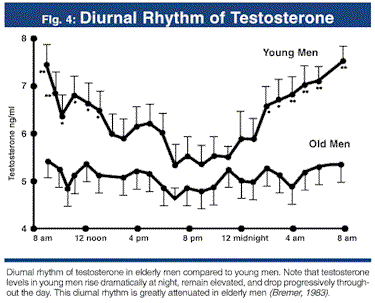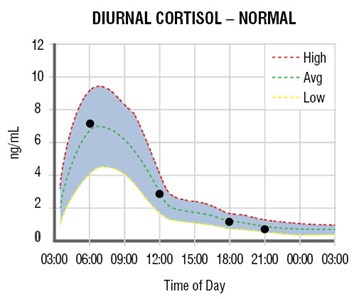Last updated: June 26, 2024
2 mins read
What is the testosterone:cortisol ratio?
The testosterone:cortisol ratio shows an important relationship between two critical hormonal biomarkers. Testosterone is widely regarded as a major anabolic hormone. Anabolic reactions create or build a product, and one function of testosterone is muscle growth. On the other hand, cortisol is linked to catabolism, which is the breakdown of products. In excess, cortisol may decrease muscle mass. As a result, the testosterone:cortisol ratio is generally linked to athletic performance with most athletes seeking to increase this ratio to enhance tissue repair following exercise. Along with muscle growth, a high testosterone:cortisol ratio may be linked to social aggression and psychopathy.
How can I better understand my testosterone:cortisol ratio?
When interpreting results, it is important to consider the rhythmic fluctuations that both testosterone and cortisol experience throughout the day.
Testosterone, like many hormones, follows a diurnal rhythm, peaking in the morning and dipping in the early evening. Peak secretion occurs between 7 and 10 a.m., which is why testing testosterone levels in the morning helps to limit variations, particularly in younger men.
Cortisol also follows a diurnal rhythm that is affected by sleep- naturally rising in the early morning and falling in the evening. It is recommended to test cortisol at around 6 – 8 a.m.
A high testosterone:cortisol ratio is preferred for athletes and may suggest well-rested conditions, effective training, or peak performance periods. A low testosterone:cortisol ratio may suggest high stress, overtraining, inadequate recovery, or illness. If you are concerned about any of your results, please consult with your physician.
How can I maintain an optimal testosterone:cortisol ratio?
If you need to maintain or adjust your testosterone:cortisol ratio, it is best to focus on improving your testosterone and cortisol levels. Please refer to our testosterone and cortisol biomarker pages for helpful tips and more information.
Where can I learn more?
- Open Sports Sciences Journal – Use of the Testosterone/Cortisol Ratio Variable in Sports
- Gray’s Medicine (video) – The Relationship Between Testosterone and Cortisol
DISCLAIMER: IF YOU ARE CONCERNED WITH ANY OF YOUR RESULTS, PLEASE CONSULT WITH YOUR PHYSICIAN.




